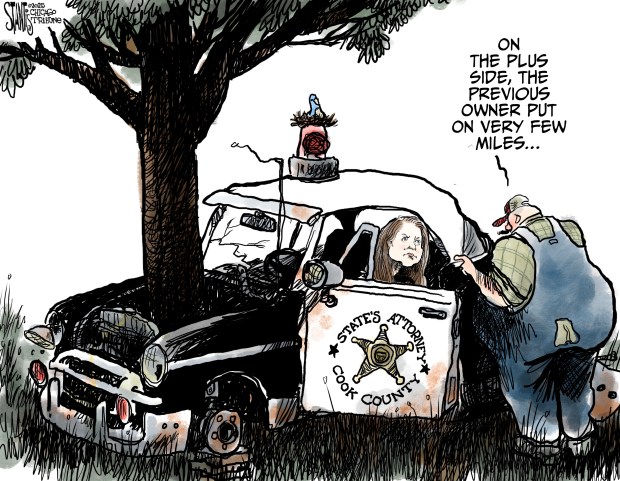Statesmanship is rare in American politics. It’s even rarer during political campaigns. And it’s virtually nonexistent when it comes to political campaigns and immigration.
I assumed we had hit rock bottom when Donald Trump and JD Vance unleashed their rhetorical fury on Haitian immigrants in Springfield, Ohio. But Trump’s invective toward immigrants continues. He said, with no basis in fact, that migrants are “attacking villages and cities all throughout the Midwest” and that they are “poisoning the blood of our country.”
Trump’s descent to the rhetorical cellar on immigration is relentless and shameful. Sadly, the Democratic response has been timid and tactical. Democrats scold him for his dehumanizing language but accept some of his hard-line border enforcement proposals. Few national leaders have demonstrated statesmanship.
However, following the Trump-Vance assault on Springfield, I was gratified to see flickers and flashes of statesmanship from local public officials and community members.
Robert Rue, the city’s Republican mayor, has called for respect, civility and kindness, citing the Haitian immigrants’ contributions to the community.
Ohio’s Republican governor, Mike DeWine, had the temerity to take to the opinion pages of The New York Times last month and challenge Trump and Vance’s attacks, saying Haitians in Springfield are there legally and are eager to work.
Though local businessman Jamie McGregor faced personal threats for defending his Haitian employees, he refused to retreat, saying he wished he had more of them. “I think this whole notion of migrants taking American jobs in hogwash. … You know, my family was once an immigrant. And so, I wonder how they were accepted.”
Arguably, no single issue in American life is in greater need of statesmanship than immigration.
Unfortunately, it’s in short supply as demonstrated by the recent immigration debate on Capitol Hill. Republican U.S. Sen. Jim Lankford voted against his own plan for immigration reform, whereas Democrats, who are deeply ambivalent about his bill, suddenly became its most vocal supporters, seizing on it as a political shield and sword against Trump’s assaults.
We need principled statesmen and stateswomen to advance an immigration agenda with four pillars and a clear message.
First, emphasize America’s foundational story as a nation of immigrants. We all remember the words inscribed on the Statue of Liberty: “Give me your tired, your poor, your huddled masses yearning to breathe free.”
This affirmative narrative has been advanced by such different political leaders as John F. Kennedy and Ronald Reagan. As a U.S. senator, Kennedy wrote a book, “A Nation of Immigrants,” that argued that “immigration policy should be generous; it should be fair; it should be flexible. With such a policy we can turn to the world, and our own past, with clean hands and a clear conscience.” Reagan issued a statement on immigration in his first year as president. It began, “Our nation is a nation of immigrants. More than any other country, our strength comes from our own immigrant heritage and our capacity to welcome those from other lands.”
Second, underscore our nation’s humanitarian traditions. The United States has offered a home for the persecuted for much of our history. In the last century, we welcomed millions from war-ravaged lands. The U.S. has admitted more than 3 million refugees since 1980. Let us be mindful of this history as we reform policies on refugees and asylum-seekers.
Third, emphasize the economic benefits of immigration. Put simply, immigrants power our economy. As the American workforce ages, and with the U.S. population projected to shrink in coming decades, we will need enterprising immigrants.
Fourth, acknowledge that a secure border is essential to protect our nation and ease the fears of many Americans. Progressive Democratic U.S. Rep. Barbara Jordan said three decades ago that “any nation worth its salt must control its borders.”
With this foundation of idealism, compassion, economic pragmatism and security, the overarching message of our immigration policy should be hope, optimism and opportunity. Immigrants make America better.
However, recent polls show a growing number of Americans support limiting immigration and imposing aggressively restrictive measures. The national mood is fearful, defensive and often accusatory.
So there is real political risk and uncertain reward in challenging Americans to summon our “better angels” on immigration. But there is no issue more worthy of risking a political career. Statesmanship requires elevating the debate and educating the public, not pandering to Americans’ prejudices and fueling their fears. It requires leaders willing to challenge the assumptions of their supporters and to offer nuanced plans that deal with the full complexity of the issue.
The immigration debate has generated searing rhetoric and haunting images. It has left an enduring memory for me. In 2015, Pope Francis spoke before a joint session of Congress. I sat in the press galley, high above the House floor, with a clear view of the pope and our senators and representatives.
Francis’ words were strikingly poignant. “In recent centuries, millions of people came to this land to pursue their dream of building a future in freedom.” The Argentine native continued, “We, the people of this continent, are not fearful of foreigners, because most of us were once foreigners. I say this to you as the son of immigrants, knowing that so many of you are also descended from immigrants.”
I saw dozens of lawmakers visibly moved by the pope’s words. Some appeared to be holding back tears. Or were they stifling their shame?
We must rise to the moment and be worthy of the sacrifices that our parents and grandparents — many of whom were immigrants — made.
John T. Shaw is the director of the Paul Simon Public Policy Institute. His new book is “The Education of a Statesman: How Global Leaders Can Repair a Fractured World.”
Submit a letter, of no more than 400 words, to the editor here or email letters@chicagotribune.com.



